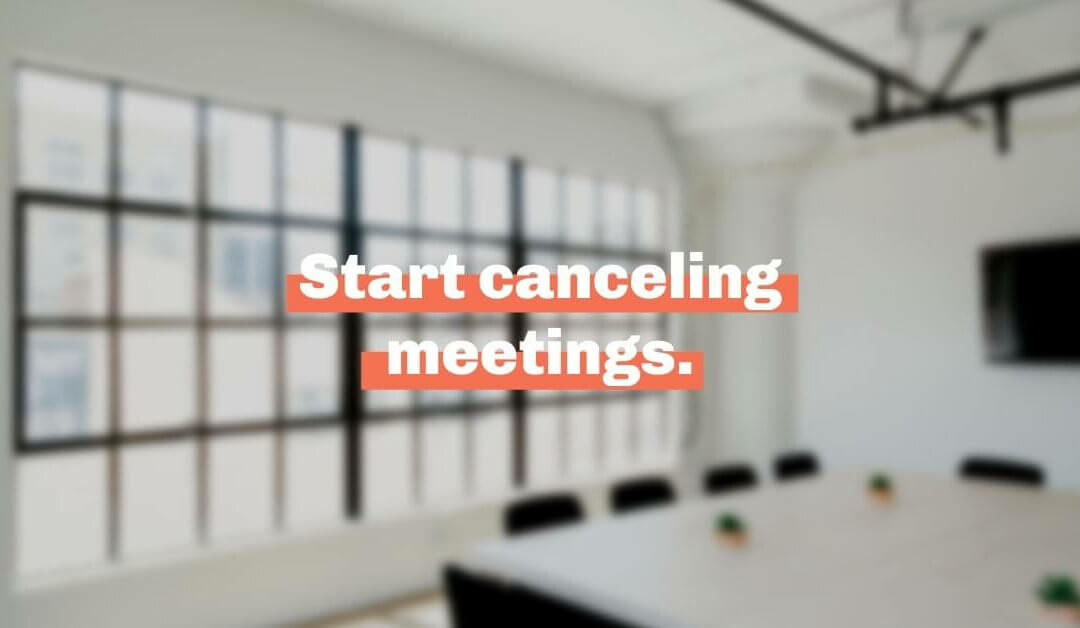
by Allison Kooser | Sep 2, 2021 | +Good Newsletter, The Intro
This week, while scrolling Instagram, a quote from Adam Grant stopped me in my tracks:
Bad bosses mistake visibility for value. They reward face time over impact.
Good bosses know reputation isn’t a proxy for results. They reward performance over presence.
Great bosses know quality work depends of quality of life. They offer flexibility as a right, not a reward.
Wow. Yes. All of that.
Our team is unique. As we’ve shared before, we work entirely asynchronously and have structured our whole company to accommodate extremely flexible schedules.
We know you probably don’t have quite that same level of freedom.
But here’s the deal:
You deserve a schedule that works for your life, not a life that constantly bends to the will of your work schedule.
This gets complicated for nonprofit leaders because we love what we do. We’re making lives better. We’re having an impact. We’re changing the world. So we should bend over backwards to accommodate our work. We should respond at all hours. We should be available. Right?
I lived in this posture for years—and all I got was exhaustion, frustration, and a severe case of workaholism. Turns out it’s healthy to pause. Turns out people respect you more when you set boundaries. And turns out you really do need a life outside of work—even when that work is good and meaningful and beloved.
So the question is how?
How do you set boundaries for yourself?
And, if you’re a leader, how do you cultivate a culture of trust and freedom for your team? How do you become one of Adam Grant’s “great bosses” who offers flexibility as a right, not a reward?
Our team is still learning. And I am definitely still learning. But here are a few questions to get you started:
- Can you cancel any meetings? Step one to a more open schedule is removing things that are wasting your time.
- What is important to you that is currently getting back-burnered? It could be a relationship, a hobby, more hands-on parenting, exercise, reading for fun, investing in your own education…whatever!
- Can you put these things on your calendar? Literally treat them like an appointment and block the time.
- As a leader, what if you trusted your team (and yourself) to do their jobs and didn’t worry so much about the hours they spent in the office (or on Zoom)?
- As a leader, do you know what your team loves? Do you know what their non-work-related goals or priorities are?
- As a leader, what could you do today to give your team more flexibility, ownership, and autonomy? (Did you know that higher levels of autonomy tend to result in higher levels of work satisfaction?)
Your work is awesome. But think how much more awesome it would be if you got to do it on your own terms.

by Allison Kooser | Aug 28, 2021 | +Good Newsletter, Gratitudes
This week, we are thankful for…the flexibility to start over. Do you ever have a great idea that turns out to be a terrible idea? You know what we mean…one of those “brilliant” thoughts that, as soon as you start acting on it, falls apart immediately.
Yeah.
We’ve all got them. So this week, we’re grateful for the flexibility to start over. To go back to the drawing board. And to keep dreaming up big ideas—regardless of whether they work or not. (Also, huge shout-out to ice cream. Thanks for making our days brighter—this week and always!)

by Allison Kooser | Aug 26, 2021 | The Intro
All too often, we live in an either/or culture. It’s this way or that way. This decision or that one.
Here at Swell+Good, we are getting better and better at choosing and.
And while there are countless very serious topics that could benefit from a good “and” conversation, today, we’re thinking about one of our favorites (that is, admittedly, not all that serious at all):
Deadlines are stupid and long live deadlines.
We pick both.
Look, we get it. Deadlines are almost always self-imposed and arbitrary. We pick a date and then rush to meet the goal we set for ourselves. Do our donors care? No. Would it matter if we picked the next day, or the day after that? In most instances, probably not.
In our most creative moments, we find ourselves nodding along to ideas presented by Basecamp founder Jason Fried, who refuses to set goals and instead just “does the best he can.” His book, It Doesn’t Have to be Crazy at Work, challenged us to reconsider so many of our built-in business practices.
But then we remember something else:
We suck without deadlines.
Having checkpoints (even arbitrary ones) keeps our team moving forward. And when we’re working on deliverables that impact our colleagues and clients, meeting those key dates is an essential quality of being a good partner.
As much as we want to live in the freedom of doing good work, we know that, at least for us, timelines matter. Goals matter. Milestones matter. And yes, deadlines matter, too.
So we choose and.
Yes, deadlines are made up. They’re random. And they’re often pretty pointless.
And also, we love them. They help make our work better—or at least help us get our work done. And they help ensure that we keep moving forward.

by Allison Kooser | Aug 21, 2021 | +Good Newsletter, Gratitudes
This week, we are thankful for…honest conversations. Yes, they are hard. And yes, while they are happening, they can be painful. But summoning the courage to voice your candid wants and needs is so much better than bottling them up and hoping that things magically change. Despite the in-the-moment awkwardness, it’s always better to face the challenge (or decision or conflict or question) head-on and deal with it—regardless of the outcome.

by Allison Kooser | Aug 20, 2021 | +Good Newsletter, The Intro
Looking for an easy way to make your team more productive, more creative, and (almost certainly) happier?
Start canceling meetings. Today.
If I can point to one practice that has helped me pivot from being a full-fledged workaholic to a person with a fair amount of margin in her day, it has been my willingness to ruthlessly eliminate meetings from my day.
By canceling 70% of my meetings, I have (magically) freed up my work week. I am sitting on an extra dozen hours of time to actually do work.
And I’m not alone.
As a recent Digiday article noted, “As more statistics link meeting overload to burnout, a crackdown on meeting culture is emerging.”
While canceling all of your meetings might not be possible, there are definitely small steps you can take to make your meetings more productive (and give your calendar a bit more breathing room).
Begin by asking the tough questions like…
What is this meeting costing your organization?
Do you have all of your senior leaders in a room for 2 hours? Think about what that time is worth…
What is the opportunity cost of this meeting?
What else could you be doing with this time—and is that something else more important?
Do you know exactly what you’re hoping to accomplish in the meeting?
Going into a meeting without a goal is a surefire way to waste time.
Are you prepared for the meeting?
Do you have notes? An agenda? Pre-reads? Do all of the attendees know what they’re supposed to bring to the table?
Can you make the meeting shorter?
Sure, canceling meetings might not be possible—but you can definitely save yourself some time by cutting an hour into 30 minutes, or 30 minutes into 15!
No agenda? Decline.
Is this really a simple question? Just send it to me and I’ll answer it. Do you need me to brainstorm? Great. Put pen to paper for a few minutes and I’ll start there.
Here at Swell+Good, our team works asynchronously (we do not have fixed business hours) which makes meetings nearly impossible and has forced us to double down on other forms of communication. We’re pros at messaging, written updates, and shared notes and files—and when we actually speak in real-time, it is much more about relationship building than getting things done.
With clients, we’re strategic. We come to meetings armed with questions, stick to our agendas, and keep meetings as short as possible—we’ll happily host a 5-minute update and call it a day (no need to fill 30 minutes if you don’t have 30 minutes of things to talk about!).
A no-meeting (or fewer-meetings) life is a beautiful thing. So open that calendar and start canceling.
Need help thinking through how to make your meetings more effective—or how to get rid of some of them altogether? Reach out by replying to this email! We’d love to help!





